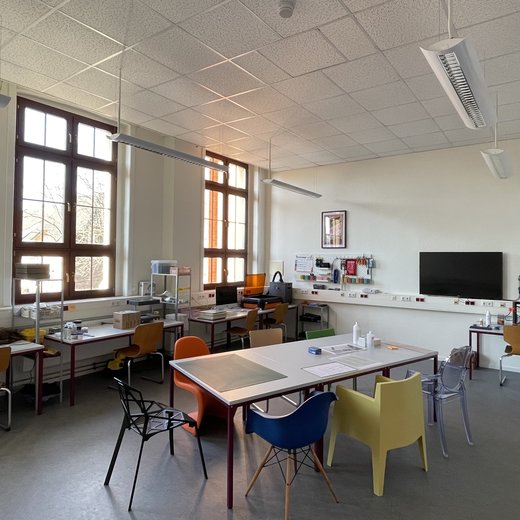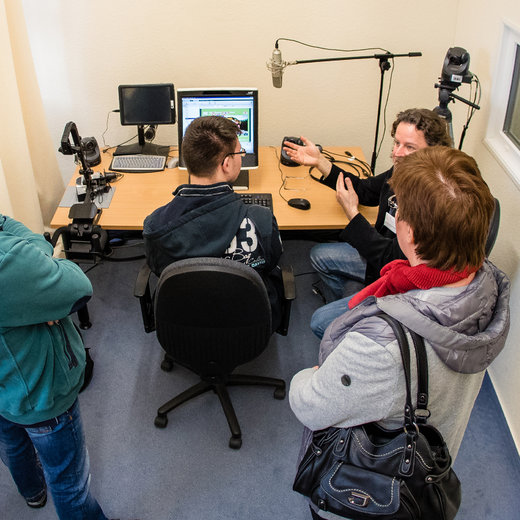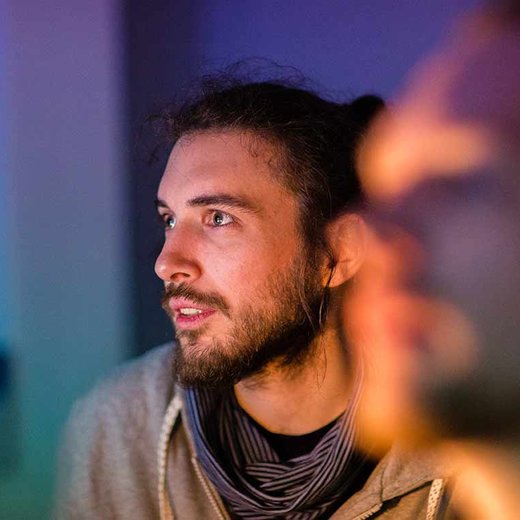
I like the easy-going atmosphere and cohesion among my fellow students in the department. I particularly like the individual mentoring and support.
Luu Hanh, Applied Computer Science Student and Germany Scholarship Holder
- HCI Design Lab
- User Experience Design Lab
- Greenbox
- MaLea Lab
- Institute for Applied Computer Science e.V.
Human-Computer Interaction: HCI Design Lab
The HCI Design Lab is a design studio and makerspace at the Chair of Human-Computer Interaction at Anhalt University of Applied Sciences. Tools for prototyping hybrid materials, "things" for the Internet of Things and smart objects are available here. These include a 3D printer, laser cutter, vacuum forming machine, sewing machine, soldering station, multifunction tool, basic workshop equipment, and an extensive range of Arduino components. Students and faculty can design, build, and evaluate digital and analog prototypes and demonstrators in the HCI Design Lab.
The HCI Design Lab provides a friendly and creative atmosphere. We are committed to an experimental, collaborative and open culture. The modules Design Interactive Media and Interaction & Experience Design take place here.
Please contact Prof. Dr. Arne Berger, if you have questions about the lab or would like to work there.
Workshop equipment (not a complete list)
- 3D Printer (Prusa)
- Laser cutter (Emblaser)
- Sewing machine (W6 Wertarbeit)
- Vacuum Forming Machine (Mayku Formbox)
- Consumables (3dPrint filament, paper, cardboard, wood, metal, plastic, glue, paint, copper wire, conductive pens, batteries, chargers)
- Soldering station and accessories
- Basic workshop equipment (hammer, file, pliers, multifunctional tools, hot glue gun)
- Hardware components (Arduino, Raspberry Pi, ESP8266, sensors, actuators)
- Photo studio for documentaries (Sony A7III, lenses, flash equipment)
- CNC milling machine (planned)
What is human-computer interaction?
Human-computer interaction is an interface discipline. It explores the design and use of computing technology at the intersection of humans and computers. It is also the interdisciplinary interface of computer science, psychology, cognitive science, ergonomics, sociology, and design.
 © Berger
© Berger
User Experience Design Lab
This lab makes it possible to test web pages, software, and other digital products with potential users. The laboratory is equipped with the latest technology. In addition to a computer, there are two ceiling microphones and four cameras in the test room. The latter are freely movable and can cover the entire room. Both screen content and all test person interactions can be recorded. Other equipment includes an eye tracker that can be used to record the eye movements of test persons. Based on the test persons' reactions, the number of interactions made and the time it takes to resolve problems, it is possible to identify product weak spots and how to fix them.
With this facility, the department combines science and practice in an innovative way, as the laboratory is not only intended for research purposes. Companies in the region can also commission studies here.
 © Hochschule Anhalt, Fachbereich Informatik und Sprachen
© Hochschule Anhalt, Fachbereich Informatik und Sprachen
Video/Audio Lab "Greenbox"
The Greenbox is the first choice for audio and video productions. In addition to color-based image release, the lab allows for the use of extensive film, sound, and television equipment, including the appropriate lighting.
The space can be used as a virtual studio and for project work, such as in the module “Media Production”. Project results on this can be found on our YouTube channel.
 © Hartmut Boesener
© Hartmut Boesener
Testing ground for Machine Learning in the MaLea Lab
Machine learning (ML) and innovative, modern data analytics are becoming increasingly important in business processes. The ego.-Incubator MaLea Lab supports founders (students and employees of the universities of Saxony-Anhalt) in the integration of machine learning into their business idea as well as in the implementation of data-driven business ideas.
MaLea Lab provides modern ML workstations and ML servers in addition to offers such as consulting and workshops. It offers a field of experimentation for those interested in developing, testing and implementing their own ideas, either on their own or with the support of the experts at the MaLea Lab.
In order to meet the requirements of analyzing large amounts of data and performing extensive computations, the technology used is based on high-priced, industry-standard configurations with today's high-performance CPUs, large memory and data storage, and powerful graphics cards. The latter enable high computing speeds by means of through extreme parallelization of similar, repetitive processes.
I@I
The "Institut für angewandte Informatik e.V." (Institute for Applied Computer Science) was founded by professors and staff of the Department of Computer Science and Languages and is an institution associated with Anhalt University. The team of the Institute consists mainly of professors from the Department of Computer Science and Languages at Anhalt University.
This means that a wide range of expertise is available. The Institute is led by Prof. Dr. Volkmar Richter as Director, Prof. Korinna Bade as Deputy Director and Karsten Zischner as Treasurer.
Contact details of the board